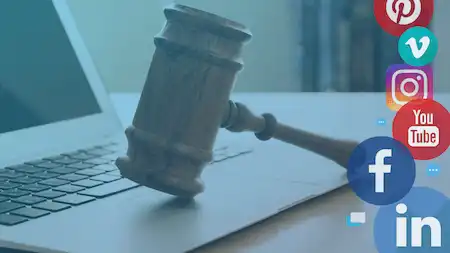Public Records Laws and Social Media Retention in
California
California Public Records Act and Social Media
California has over 431 active social media accounts run by public agencies with 38 million followers. The California Public Records Act requires that government agencies preserve public records regardless of physical form and specifies “any form of communication or representation.” Therefore social media records in California qualify as public information under the law.
California Law Text
7920.530. (a) As used in this division, “public records” includes any writing containing information relating to the conduct of the public’s business prepared, owned, used, or retained by any state or local agency, regardless of physical form or characteristics.
7920.545. As used in this division, “writing” means any handwriting, typewriting, printing, photostating, photographing, photocopying, transmitting by electronic mail or facsimile, and every other means of recording upon any tangible thing any form of communication or representation, including letters, words, pictures, sounds, or symbols, or combinations thereof, and any record thereby created, regardless of the manner in which the record has been stored.
Guidance from the California Secretary of State Records and Information Management Program
The California Records and Information Management Program (CalRIM), a department of the Secretary of State, has issued guidelines that explain when agencies need to retain social media records in California. The document supports agencies’ use of social media to engage with the public and outlines criteria for determining when its use creates records that entities must retain.
California Social Media Records Guidance from the Secretary of State
Excerpt from Records Management Handbook, Chapter 3 – Electronic Records and Storage
“Because these websites can be shut down at any moment in time, creating a plan on how to export records from a social media site to a record keeping system is important and should be created in collaboration with an agency’s IT department. If the public is able to interact with the agency via the social media platform, there needs to be a mechanism to track and manage all comments and questions in accordance with the retention schedule.”
Social Media Records Guidance from CalRIM
Need Help Navigating Digital Records Compliance?
We have a team of specialists ready to assist you with the complexities of public records laws. Request more information from a records specialist to learn more or set up a discussion about record-keeping requirements and digital records management strategies.
Proposition 42 and Government Social Media
The passage of Proposition 42 in June of 2014 amended the state constitution to require that local governments abide by the California Public Records Act. The new law also ends reimbursement from the state government of costs incurred by local governments in fulfilling records requests.
California Social Media Records Management in Practice
Palo Alto, LA County, Montague, Fullerton, and Concord are just a few of the more than 100 cities, counties, and public agencies that have adopted comprehensive social media policies that clearly state, “social media sites are subject to the California Public Records Act.” The social media policy of South San Francisco provides a clear example.
South San Francisco's Social Media Policy
City of South San Francisco Social Media Policy
9) City Social Media sites are subject to the California Public Records Act. Any content maintained in Social Media format that is related to City business, including a list of subscribers, posted communication, and communication submitted for posting, may be a public record subject to public disclosure. For Public Records Act requests, please contact the City Clerk’s office directly.
Assembly Bill 1475
In 2021, Assembly Bill 1475 was passed and approved by the Governor. This bill prohibits the posting of booking photos, often called “mugshots”, for individuals arrested on suspicion of nonviolent crimes. Affecting police departments and other law enforcement agencies, this bill also requires that police departments remove these photos from social media pages in most cases if they are already present.
This causes issues for social media record retention for the California Public Records Act. Removing images and posts from social media may also mean deleting public records if you aren’t preserving records outside of the social media site.
Assembly Bill 1475 Law Text
Excerpt from Assembly Bill No. 1475
“The bill would require a police department or sheriff’s office that shares, on social media, a booking photo of an individual arrested for the suspected commission of a nonviolent crime to remove the information from its social media page, upon request, unless the same specified circumstances exist. The bill would require a police department or sheriff’s office to remove the booking photo of a person who has committed any other crime from social media if the individual’s record has been sealed, the individual’s conviction has been dismissed, expunged, pardoned, or eradicated pursuant to law, the individual has been issued a certificate of rehabilitation, the individual is found not guilty of committing the crime for which they were arrested, or the individual was ultimately not charged with the crime or the charges were dismissed.”
Social Media Record Retention Legal News in California
Read about California cases and precedents involving social media and public record retention.

City attorney states that public officials’ social media accounts are considered a public forum and a source of public records.
An El Cajon, CA, city councilman received a lawsuit for restricting citizens’ first amendment rights by blocking them from his Facebook page. The city attorney ruled in favor of the citizens, stating that even council members’ personal social media pages can be considered public records.
San Mateo, CA, sued for not maintaining a record of social media in accordance with the California Public Records Act
A resident issued a records request for the police department’s direct messages on Twitter. The City could not fulfill the request because the department’s Twitter account had been hacked, and all direct messages were deleted. The City settled to avoid litigation and agreed to start archiving direct messages from Twitter (now X).